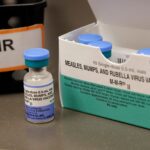At Local MD, we believe in exploring the modern frontiers of health — including how seemingly unrelated symptoms like fatigue and cognitive fog may share a common origin in the gut. One concept gaining increasing attention is intestinal permeability (commonly referred to as “leaky gut”), and its potential connection to brain fog and Chronic Fatigue Syndrome (CFS). In this article, we’ll examine current research, mechanisms, signs, and practical strategies to support gut-brain health — helping you understand why this connection may matter for your wellbeing.
What Is “Leaky Gut” (Intestinal Permeability)?
The gastrointestinal tract is protected by a lining designed to allow appropriate absorption of nutrients while blocking unwanted substances. When that barrier becomes compromised, larger molecules — toxins, microbes, undigested food particles — may pass through into the bloodstream. This is referred to as increased intestinal permeability.
Although the term “leaky gut syndrome” is widely used in complementary and functional medicine, it is not formally recognised as a disease in conventional medicine. Researchers note that while increased gut permeability is real and seen in certain gastrointestinal disorders, the extent of its contribution to symptoms like brain fog and chronic fatigue remains under investigation.
Understanding the Gut-Brain Axis: How the Gut Talks to the Brain
The concept of the gut-brain axis describes the bidirectional communication between the gastrointestinal tract and the central nervous system. Key pathways include the vagus nerve, immune signaling, microbial metabolites, and endocrine-chemical messengers.
When gut health is compromised (for example by dysbiosis, chronic inflammation, or increased permeability), these communication channels may become. For instance, elevated levels of pro-inflammatory cytokines (originating in the gut) can cross or disrupt the blood-brain barrier and impact neural circuits.
How a Compromised Gut Barrier Can Lead to Brain Fog and Chronic Fatigue
Microbial and Toxin Translocation → Systemic Inflammation
With increased gut permeability, components like lipopolysaccharide (LPS) from gram-negative bacteria may enter the bloodstream, triggering immune activation and low-grade systemic inflammation. This persistent immune activation can impose an energetic burden on the body, contributing to fatigue and reduced cognitive function.
Immune-Mediated Impact on the Brain
Inflammatory molecules circulating systemically can affect the brain by altering neurotransmitter production, disrupting neural signalling, or impairing the blood-brain barrier. The result: cognitive sluggishness, poor concentration, and the subjective feeling of “brain fog”.
Dysbiosis and Nutrient Malabsorption
An unhealthy gut environment may interfere with absorption of nutrients vital for brain and energy-metabolism (e.g., B-vitamins, magnesium, amino acids). Reduced availability of these nutrients undermines mitochondrial energy production and neural repair, thus feeding fatigue and mental fog.
HPA-Axis and Stress Interactions
Gut disruption may influence the hypothalamic-pituitary-adrenal (HPA) axis, leading to dysregulated stress responses. Chronic stress, in turn, promotes gut permeability — creating a vicious cycle. In the context of CFS, where post-exertional malaise and impaired recovery are hallmarks, this becomes especially relevant.
Specific Evidence in CFS/ME
Research into Myalgic Encephalomyelitis/Chronic Fatigue Syndrome (ME/CFS) suggests that individuals may exhibit higher markers of gut damage (e.g., intestinal fatty acid-binding protein) and increased antibodies to bacterial components—signs consistent with increased intestinal permeability. These findings align with reports of fatigue, cognitive dysfunction and post-exertional malaise in this population.
Recognizing the Signs: Brain Fog, Chronic Fatigue and Gut Link
Brain Fog
This term refers to impairments in cognition, such as:
-
Difficulty concentrating or staying on task
-
Memory lapses or slowed recall
-
Hazy thinking, inability to “clear your mind”
-
Feeling mentally slow or less alert
Studies link gut inflammation and dysbiosis to such cognitive phenomena.
Chronic Fatigue Syndrome (CFS/ME)
Beyond normal tiredness, CFS involves profound, persistent fatigue not resolved by rest, often accompanied by:
-
Post-exertional malaise (PEM)
-
Unrefreshing sleep
-
Cognitive difficulties (“brain fog”)
-
Orthostatic intolerance, pain, or immune impairments
As noted, evidence suggests gut-related mechanisms may play a role in some cases of CFS/ME.
Gut-Related Symptoms That May Co-Occur
While not exclusive, individuals who suspect a gut-brain connection may also report:
-
Bloating, gas, irregular bowel habits
-
Food sensitivities or new intolerances
-
Skin flare-ups, joint aches, low-grade inflammation
-
Nutrient deficiencies or signs of malabsorption
It’s important to emphasise: these signs are not definitive proof of intestinal permeability, but may signal the need for further evaluation.
Examining the Evidence and Current Limitations
While the theoretical framework for gut-brain interaction is strong, it’s essential to recognise current limitations:
-
The term “leaky gut syndrome” remains non-official in medical diagnostics.
-
Many symptoms (fatigue, brain fog) are non-specific and have multiple potential causes.
-
There is no standard clinical test widely used to diagnose gut hyper-permeability outside research settings.
-
Most studies are associative, not fully causal; more large-scale human trials are needed. That said, the link between gut health, systemic inflammation and cognitive/energy symptoms is increasingly supported.
At Local MD, we proceed with both scientific caution and clinical prudence—addressing gut health as part of a broader integrative evaluation when symptoms like brain fog and chronic fatigue are present.
Actionable Strategies: Supporting Gut-Brain Health
Here are evidence-based steps you can take to support your gut-brain axis and address potential links between intestinal permeability, brain fog and fatigue.
Optimize Your Diet
-
Emphasise whole, minimally processed foods rich in fibre, lean proteins, healthy fats and abundant vegetables and fruits.
-
Include prebiotic fibres (e.g., onions, garlic, asparagus) and consider probiotic-rich foods (e.g., yogurt, kefir, fermented vegetables) to support gut microbiome diversity.
-
Limit excessive sugar, refined carbohydrates, and ultra-processed foods which may fuel dysbiosis and gut inflammation.
-
Consider possible food sensitivities or triggers (gluten, dairy) if you notice patterns of worsening cognition or fatigue after consumption.
Manage Stress and Promote Recovery
Chronic stress influences gut permeability, immune function and HPA-axis regulation. Incorporate:
-
Adequate sleep (aim for 7 – 9 hours)
-
Relaxation modalities (deep breathing, mindfulness, yoga)
-
Recovery periods if you have fatigue-sensitive conditions like CFS/ME
-
Moderate physical activity—avoid over-exertion, especially if you experience post-exertional malaise
Support the Gut Barrier and Immune System
-
Avoid excessive NSAID use, alcohol abuse or other agents that may damage gut lining
-
Ensure adequate hydration and moderate digestive load
-
Consider, under professional guidance, nutrients known to support gut lining (e.g., glutamine, zinc) but only as part of comprehensive plan
-
Address any GI conditions (e.g., SIBO, IBD, celiac) under specialist care
Focus on Cognitive and Energy Rehabilitation
-
Given the gut-brain link, improving gut health can yield cognitive benefits. Studies show improvements in brain fog when gut health is optimised.
-
Ensure you’re meeting nutrient needs vital for cognition — B12, iron, magnesium, omega-3 fatty acids
-
Seek professional evaluation for persistent fatigue or brain fog to exclude other causes (thyroid, sleep disorders, depression, anaemia)
Consider Professional Evaluation and Monitoring
At Local MD, our approach may include:
-
Detailed history including gut, cognitive, fatigue and sleep symptoms
-
Laboratory evaluation (e.g., inflammatory markers, nutrient status, GI pathogen screening)
-
Collaboration with gastroenterologists if gut disease is suspected
-
Tailored plan integrating diet, lifestyle, cognitive and gut-health support
-
Patient education on realistic timelines: improvements in cognitive clarity and fatigue may take weeks-to-months rather than days
Case Scenario: Linking Gut Leakage to Cognitive & Fatigue Symptoms
Consider a woman in her 40s who reports persistent “brain fog” (difficulty focusing at work), unrefreshing sleep, and general fatigue despite a “healthy diet”. She also notices bloating and occasional food sensitivity to dairy. A thoughtful work-up reveals subtle iron deficiency, and increased intestinal permeability markers are found in a specialist GI panel. With a treatment plan addressing gut-barrier repair (diet modifications, prebiotic/probiotic use, nutrient repletion, stress management), she gradually reports clearer thinking, improved energy, and better mood over 12 weeks.
While this is a hypothetical example, it illustrates how complex symptoms across cognitive, digestive and energy domains may share a common root in gut-brain axis disruption — and how integrative intervention can yield meaningful improvement.
When to Seek Medical Advice
It’s important to stress: brain fog and chronic fatigue have many possible causes. You should seek medical evaluation if you experience:
-
Sudden or unexplained cognitive changes (memory loss, confusion)
-
Severe fatigue impacting daily life, especially if lasting weeks/months
-
Associated symptoms like unintentional weight loss, persistent GI bleeding, night-sweats, or severe mood disorders
-
Known diagnosis of inflammatory gut disease (e.g., IBD, celiac) or significant risk factors
In such cases, interplay with leaky gut may still be relevant — but a comprehensive medical work-up is essential.
Conclusion: A Compelling Link — But Not the Whole Story
Our understanding of how gut health influences brain and energy systems is advancing rapidly. Evidence now supports a connection between increased intestinal permeability, systemic inflammation, and symptoms like brain fog and fatigue — and particularly in conditions like CFS/ME where gut-barrier compromise appears more common.
However, we must approach the concept of “leaky gut” with scientific nuance: while the mechanisms are plausible and supported by research, the condition is not yet universally defined or diagnosed in mainstream medicine.
At Local MD, our mission is to integrate emerging science with practical patient care: assessing gut health when symptoms of clouded thinking or fatigue persist, providing tailored interventions, and supporting you through the process of recovery. By addressing gut-brain health proactively, we believe you can move toward clearer cognition, increased vitality, and better overall wellbeing.






